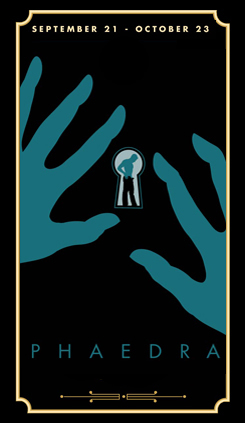|
We're A Happy Family Sam Hurwitt The family in Shotgun’s Phaedra has an awfully good reason to be unhappy: The wife is in love with her son-in-law, and what she does when he rejects her—well, it’s not good. The tale from ancient Greek mythology has been made into plays over the centuries by Euripides, Seneca, Racine, even Eugene O’Neill. Shotgun’s version is commissioned from formerly Bay Area-based Canadian playwright Adam Bock, who has a long history with the company (Swimming in the Shallows, A Fairy’s Tale, The Typographer’s Dream, The Shaker Chair). Although set in the present day, Bock’s Phaedra is a strikingly effective distillation of the original story, while still taking it in new directions. And while the staging by Rose Riordan of Portland Center Stage doesn’t rush things and takes its time, it’s much brisker and more dynamic than ACT’s too-stately production of Racine’s Phèdre in a new translation last year. Paulie is a recovering drug addict fresh out of jail, staying with his family as a condition of his parole. Whereas the husband, the Greek hero Theseus, is off adventuring somewhere in the original story, believed possibly dead, here Paulie’s father Antonio is around, just preoccupied with his work. He’s a high-ranking judge of some kind, and his constant grousing about what credulous bleeding hearts his colleagues are helps establish him as given to harsh, uncompromising and unreflective judgments. Valera Coble’s costumes for the Phaedra character Catherine always match the austere, empty white and brown walls of Nina Ball’s palatial two-level living room set. Hannah Birch Carl’s sound design is full of dramatic, echoing ocean sounds (dunno why, although Poseidon made his hand felt in other versions of this story), ticking clocks, and eerie music as if played on water-filled glasses. Clouds slowly pass through the house in lighting designer Lucas Krech’s projections. I’m not sure what all this signifies, but it certainly adds to the sense of unrest and suspense. The cast is terrific, made up of sharp local actors who haven’t played Shotgun before, with the exception of company member Trish Mulholland. Catherine Castellanos is stunning as Catherine, deeply fretful and preoccupied in a way that comes off as sour harshness. She likes things to keep things orderly, which means a near-obsession with coasters. Catherine complains that she doesn’t want Paulie there because he’s a troublemaker. “It’s never been fine before,” she says. “I don’t know why everyone thinks it’ll be fine this time.” But while at first she seems like the spiteful stepmother, as the play goes on and her wounded heart reveals itself, she’s transfixing in her rawness. One unexpected moment of hopeful self-delusion is just chilling. In a stunningly effective scene she leafs through a magazine for a long time while staring hauntingly out into the middle distance, not even glancing at the pages. Patrick Alparone gives a touching performance as the rumpled Paulie, the only character whose name is close to its mythological counterpart, Hippolytus. Although he retains some bad-boy furtiveness, he’s very serious and sincere about his recovery and following the rules. In fact his desire not to screw up again borders on desperation, because he feels this is his last chance, and he’s not wrong. Keith Burkland is a bit stiff as Antonio, but in a way that suits the character—crusty, hunched and bewildered. He’s basically a jerk who doesn’t believe in growth or redemption but that some people are just born bad, which is a terrible thing in a judge. Mulholland is amusingly inane as the cheery, nattering maid Olibia, who dotes on Paulie. As Taylor, Paulie’s new girlfriend whom he met in rehab, Cindy Im has a wonderful don’t-give-a-fuck casualness that may not be meant as a provocation, but she doesn’t care if it’s taken that way. Some of the direct-address monologues each character gets (except Paulie, unless I’m forgetting something) feel extraneous and tangential to the story, but others are remarkably effective. Bock has a wonderful flair for poetic language that he balances nicely with more plain-spoken dialogue. Olibia acts as a sad and sober Greek chorus in her introduction, saying (if I have this correctly), “In a moment she didn’t notice was a moment, Catherine made a choice she didn’t notice was a choice.” It’s a very intense, dramatic tragedy, with moments of humor but worlds away from comedy. The line that got the biggest laugh opening night isn’t funny so much as shocking, coming at a moment when the audience most needs release. And that’s the funny thing about Greek tragedy, even updated to a modern setting—that it can make even the tragic black comedy of Albee seem hopeful by comparison. There’s something to be said for accepting your unhappiness and carrying on, when the alternative is hurtling headlong toward your doom knowing that’s exactly what you’re doing. That’s why Catherine’s domestic woes echo with more than two thousand years’ worth of resonance. |
|---|


